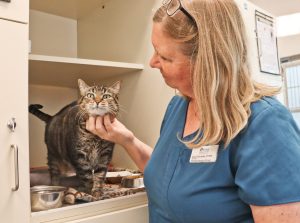February is Spay/Neuter Awareness Month
January 31, 2023
Not only is this month National Spay/Neuter Awareness month, but Tuesday, Feb. 28, is World Spay Day, an international holiday dedicated to advocating for the spaying and neutering of pets as a means to save the lives of many more. Here at Kitsap Humane Society, we strongly advocate for spaying and neutering pets and do our best to provide spaying and neutering services to low-income members of our community. While we have been offering spay/neuter services on a limited basis for the past several years, with the construction of our Russ & Linda Young Lifesaving Veterinary Center, we look forward to being able to provide more appointments once the facility is open. To celebrate World Spay Day this year, our Veterinary Services Team has put together a Cat Fix Day on Tuesday, Feb. 28. Keep an eye on our scheduling page and social media to see when appointments become available!
 In the meantime, let’s learn more about why spay and neutering your pets is important. Spaying and neutering stray and household animals not only reduces pet overpopulation, but it improves pets’ health, reduces unwanted behaviors, and is cost-effective in the long term.
In the meantime, let’s learn more about why spay and neutering your pets is important. Spaying and neutering stray and household animals not only reduces pet overpopulation, but it improves pets’ health, reduces unwanted behaviors, and is cost-effective in the long term.
Spaying/Neutering Reduces Pet Overpopulation
Every year, 1.5 million homeless pets are euthanized in shelters. By spaying or neutering your pet, you help give shelter pets an increased chance at finding a home and help decrease the number of pets entering the shelters each year.
How Spaying/Neutering Improves Your Pet’s Health
Spaying your dog or cat has many health benefits:
- If done before the first heat cycle, spaying significantly reduces the risk of mammary cancer.
- Spaying removes the risk of ovarian and uterine cancer.
- It also removes the risk of pyometra, a life-threatening uterus infection that requires expensive emergency surgery.
- Spaying your cat reduces the risk of infection with Feline Leukemia Virus (FeLV) or Feline Immunodeficiency Virus (FIV).
 Neutering your dog or cat, also, has many health benefits:
Neutering your dog or cat, also, has many health benefits:
- Neutering removes the risk of testicular cancer and greatly reduces the chances of prostate disease.
- Cats that are neutered are less likely to fight. This means they are less likely to develop abscesses (infections that require medical attention) or become infected with FeLV/FIV.
- Dogs that are not neutered are twice as likely to be hit by a car or attacked by another animal.
- Cats that are not neutered are four times more likely to be hit by a car or attacked by another animal.
Spaying/Neutering May Reduce Unwanted Behaviors
Spaying or neutering your dog or cat may help reduce unwanted behaviors including inappropriate urination and spraying at home, roaming and breaking out of the yard, aggression towards other animals and people, and mounting. However, it is not a quick fix for all behavior problems.
Spaying/Neutering Your Pet is Cost-Effective in the Long Term
While the cost of spaying/neutering your pet may seem daunting at first, paying for one surgery is much more cost-effective than caring for a pregnant pet and their offspring in the long term.
When to Spay/Neuter Your Pet
Dogs: Dogs are typically spayed or neutered between the ages of six to nine months. However, healthy puppies as young as eight weeks old can be neutered. It is also possible to neuter dogs as adults, although there is a slightly higher risk of post-op complications in senior dogs, dogs with health problems, or dogs that are overweight.
Cats: Cats are typically spayed or neutered as young as eight weeks old. To prevent the start of unwanted behaviors like urine spraying and reduce the chance of pregnancy, it is recommended to schedule the surgery before your cat turns five months old. It is possible to spay a cat while she is in heat.
Please consult your local veterinarian to determine the best time to spay/neuter your pet.



